Lori Lefkovitz
My artifacts express a relationship between Jewish feminist scholarship and the reclamation of women’s traditions.
Recently, just before I left to teach “The Literature of American Jewish Feminism” as a Fulbright Professor at the Hebrew University in Jerusalem, I received an appeal not to the Gottesman Professor of Gender and Judaism but to one of my other personae: congregational rebbetzin (rabbi’s wife). To the surprise of some friends, I take pride in this identity. I learned from the studies of Professor Shuly Rubin Schwartz that the rebbetzin’s work in the shtetl included dream interpretation, and having been a fellow at a psychoanalytic institute, I liked imagining that this Jewish art moved, in an interesting gender-trajectory, from Joseph, through the rebbetzin, to Freud.
A congregant had read in Rabbi Nina Beth Cardin’s book, Tears of Sorrow, Seeds of Hope: A Spiritual Companion for Infertility and Pregnancy Loss, about a folk custom that the rebbetzin in the shtetl would give an infertile woman a red stone. Should a healthy baby be born, the new mother returned the talisman (with its heightened power) to her rebbetzin, who could pass it on to the next struggling woman in need. I was asked to supply her with such a stone.
I composed a small blessing that God’s will – whatever it was – should be done. The stone is back in my possession, and the baby is beautiful.
This stone symbolizes for me the loving feminist reclamation of our great grandmothers’ folkways. Not so long ago, I shared the views of colleagues who felt that Jewish women could never again submit to the indignity of mikveh (ritual bath); the title rebbetzin was demeaning; and the matriarchal longing for babies was also ideologically dubious. Today, even as we export the serious analytic literature of American Jewish feminism and innovate, we also reclaim, and we find new magic in the red gems of our ancestors.
Lori Hope Lefkovitz is the Ruderman Professor and Director of the Jewish Studies Program and Director of the Humanities Center at Northeastern University. She is the author of In Scripture: The First Stories of Jewish Sexual Identity, which was named a finalist for the National Jewish Book Award in the category of Women’s Studies. Her awards include a Fulbright professorship at the Hebrew University of Jerusalem, an academic fellowship at the Philadelphia Association for Psychoanalysis, a Woodrow Wilson dissertation fellowship in the Women’s Studies Division, and a Golda Meir post-doctoral fellowship at Hebrew University. She was the founding director of Kolot, the Center for Jewish Women’s and Gender Studies at the Reconstructionist Rabbinical College, where she held a chair in Gender and Judaism, and is the founding executive editor of the website Ritualwell.org. Lefkovitz holds a BA from Brandeis University and an MA and PhD from Brown University. Her books include: Shaping Losses: Cultural Memory and the Holocaust (with Julia Epstein), Textual Bodies: Changing Boundaries of Literary Representation, and The Character of Beauty in the Victorian Novel. She has two daughters.





